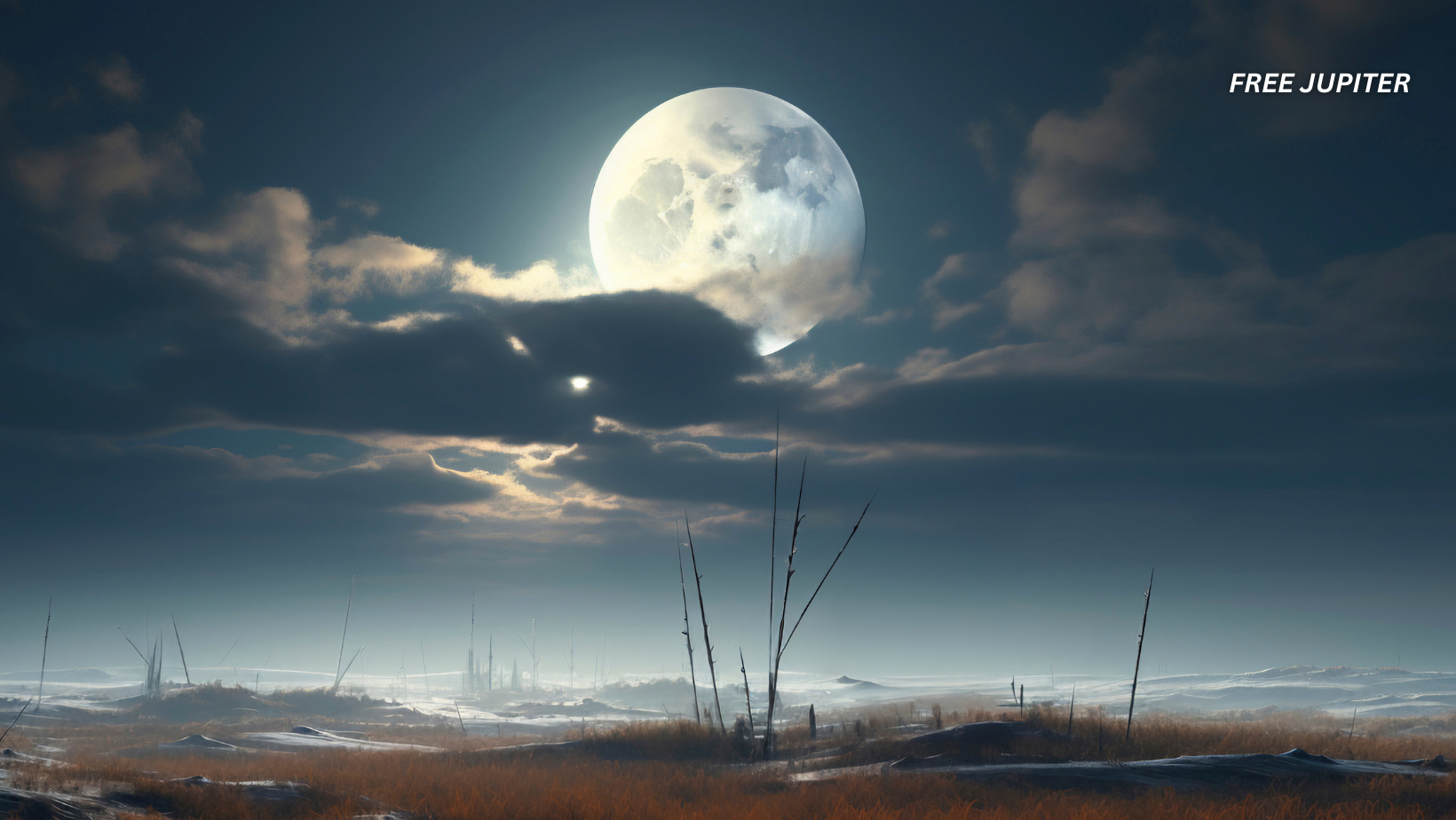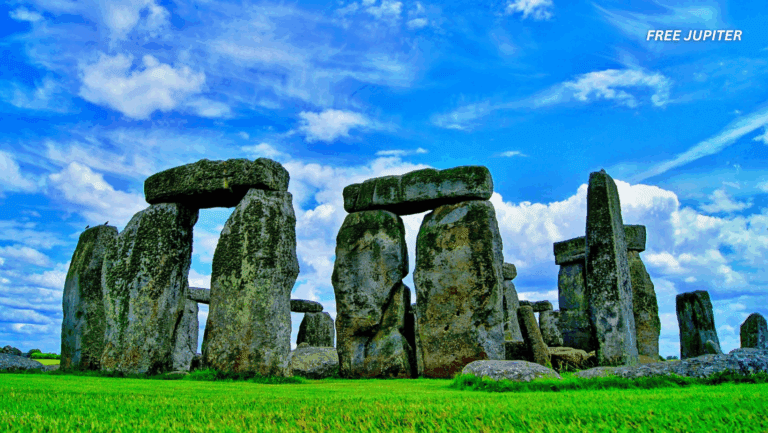Friendly Note: FreeJupiter.com shares general info for curious minds 🌟 Please fact-check all claims—and always check health matters with a professional 💙
The Moon may seem like a silent, silver ornament pinned to our night sky, but its presence is anything but passive. It’s not just a glowing sphere we gaze at when we’re feeling poetic—our Moon plays a vital, often invisible role in shaping the rhythms and stability of life on Earth.
Now, imagine—just for a moment—that the Moon simply vanished. Gone. Poof. No gentle goodbye or final full moon. What would happen to Earth? The answer is a cascade of strange and chaotic changes, some subtle, others catastrophic.
1. Celestial Debris and Ring Possibilities
Let’s start with the dramatic version: if the Moon were to vanish due to a giant impact or a sudden disintegration (say, from a collision with a massive asteroid), the consequences would be immediate—and not in a good way.
Chunks of the Moon, both massive and minuscule, would be hurled toward Earth. The larger fragments could crash into our planet, causing regional destruction, like cosmic wrecking balls. These impacts might spark wildfires, tsunamis, or even temporarily change the climate if enough debris reaches the atmosphere.
Meanwhile, the smaller, dust-like particles could get caught in Earth’s gravity and orbit the planet. Over time, they might form a temporary ring around Earth—like a gloomy version of Saturn’s bands. While it might look beautiful in the sky, the implications for satellites and future space missions would be… problematic, to say the least.
2. Eclipses? Gone with the Moon
One of the most immediate things we’d notice is the complete absence of solar and lunar eclipses. These dazzling celestial events happen because the Moon moves perfectly between the Earth and the Sun (solar eclipse), or behind the Earth into its shadow (lunar eclipse).
Without the Moon, there would be no more of these natural spectacles. Stargazers and sky photographers would lose some of their favorite events. It would be like erasing the Moon’s most theatrical performances from the cosmic calendar.
Read more: Scientists Create Light From Complete Darkness in Groundbreaking Discovery
3. A Brighter, Starrier Sky
Surprisingly, not everything would be bad. With no Moon to reflect sunlight, our night skies would become darker—and that’s actually a dream come true for astronomers. The stars, galaxies, and deep-sky objects that are usually washed out by the Moon’s glow would now shine in full clarity. Even without a telescope, you’d see more of the universe than ever before.
It’s a small consolation prize in a scenario that, let’s be honest, would otherwise be a planetary mess.
4. A Slightly Faster Day, But Not by Much
The Moon acts like a cosmic brake on Earth’s rotation. Its gravitational pull tugs on Earth’s crust, creating friction and gradually slowing down the planet’s spin over millions of years. That’s why our days have slowly grown longer since the planet formed.
Without the Moon, that braking force would vanish. Earth’s rotation would speed up ever so slightly. We’re talking about shortening each day by just a couple of milliseconds—not enough to cancel your morning coffee, but still a measurable shift over time. Without the Moon slowing things down, the Earth might spin faster in the distant future, but the change would take eons to really add up.
5. Tides Would Shrink—Drastically
The Moon is the primary reason tides exist the way they do. Its gravity pulls on Earth’s oceans, creating bulges that we experience as rising and falling tides. If the Moon were gone, this gravitational tug would mostly disappear.
While the Sun also influences tides, it does so with less power. Without the Moon, Earth’s tides would shrink by about 75%. The tides wouldn’t vanish completely, but they would be far weaker. The rhythmic dance of high and low tide along beaches would become more subtle and sluggish.
For marine life that depends on strong tides—like crabs, shellfish, and certain types of fish—this could be disastrous. Coastal ecosystems might collapse or dramatically change, and the livelihoods of many human communities could be affected as well.
6. Earth’s Tilt Would Get… Tipsy
Here’s where things start to get unsettling.
Earth tilts on its axis, currently at about 23.5 degrees, which gives us our seasons. This tilt isn’t fixed, though—it can wobble over time. Luckily, the Moon has been acting like a gravitational anchor, keeping this tilt relatively stable. Think of it like training wheels on a bike, keeping Earth from wobbling too much.
Take the Moon away, and those training wheels are gone.
Scientists believe that, over time, Earth’s axial tilt could become unstable—eventually fluctuating wildly, possibly swinging between 0° and 45°, or even more. This means that the North and South Poles might not always be icy, and the equator wouldn’t always be warm.
Read more: Scientists Uncover Hundreds of Promising Antibiotic Candidates in Snake and Spider Venom
7. Climate Chaos on Repeat
With Earth’s tilt unchained, climate zones would become unpredictable. Seasons might become extreme, even reversed, depending on where Earth is pointing in its orbit. Places that once enjoyed mild weather could suddenly freeze over, while icy regions could transform into balmy tropical zones.
Worse still, these swings could happen every few thousand years, triggering repeating cycles of ice ages and massive climate shifts. Human civilization, agriculture, and natural ecosystems would constantly have to adapt to these extremes.
Entire species could go extinct. Farming patterns would be disrupted. Cities might be forced to relocate—or vanish entirely.
8. Animal Behavior Would Be Affected
Many animals use the Moon as a kind of natural clock. For example, some birds migrate in sync with lunar phases, corals time their spawning with full moons, and predators like owls and big cats hunt better under moonlight. Without the Moon’s steady presence, these behaviors would become disrupted.
Some species might adapt, but others could struggle or disappear entirely. Humans, too, might notice changes. There’s evidence (though still debated) that the Moon affects human sleep, mood, and reproductive cycles. With its disappearance, we might see ripple effects we haven’t yet imagined.
9. A Symbolic and Cultural Loss
Beyond science, the Moon has loomed large in human culture, mythology, and art for millennia. It’s been a muse for poets, a beacon for lovers, and a guide for explorers. From ancient calendars to religious festivals, the Moon has played a key role in how humans understand time and the cosmos.
If the Moon disappeared, we’d lose not only a cosmic body but also a deep source of cultural meaning. Future generations might grow up under empty night skies, unaware of what was once there to inspire awe and wonder.
So, Could We Survive Without the Moon?
Technically, yes—life on Earth could continue in some form. But without the Moon, the planet would be a much more volatile, unpredictable, and less hospitable place. Weather patterns would shift, ecosystems would suffer, and our understanding of day, night, and seasons would change forever.
While we might adapt over time, the world would never be quite the same. The Moon’s disappearance wouldn’t bring instant doom—but it would quietly unravel the fabric of life as we know it.
Read more: Scientists Just Used CRISPR Gene Editing to Reverse the Root Cause of Down Syndrome
Final Thought: A Silent Partner We Can’t Afford to Lose
The Moon doesn’t get much credit for the heavy lifting it does. It’s easy to forget that this distant, dusty satellite keeps our planet stable, our oceans moving, and our seasons in order. It’s a silent partner in Earth’s story—reliable, subtle, and essential.
So next time you see the Moon glowing above, maybe pause for a moment and give it a quiet thank you. It’s not just lighting your path home—it’s holding Earth together in ways we’re only beginning to understand.










